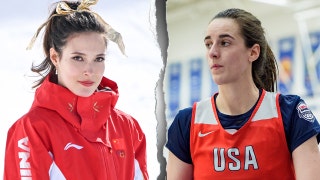A day before the Olympic gold medal game, players and coaches from the U.S. and Japanese women’s soccer teams stood in front of reporters side-by-side, like buddies on the same squad, arms linked around each other’s waists. The white warmup jackets of the United States alternated with the blue ones from Japan.
All that cordiality? It ends at kickoff.
“They snatched our dream last year,” U.S. midfielder Megan Rapinoe said. “And still we have that respect for them.”
No matter the result Thursday, the Olympic women’s soccer tournament couldn’t ask for a better finale. The teams from last year’s World Cup final meet again at Wembley Stadium, with organizers expecting the largest crowd ever to watch women play the sport at a Summer Games.
For the players, of course, the result does matter. The Japanese are attempting become the first team to win World Cup and Olympic titles in back-to-back years. The Americans are bent on mending the heartache from a penalty kick shootout in Frankfurt 13 months ago.
“I’ve been hoping for this final,” U.S. forward Abby Wambach said, “from the moment I stepped off the podium in Germany.”
Few are more passionate about the need to scratch the World Cup itch than Wambach, who earlier this week gave an impassioned monologue that recapped the “nightmares” from last year’s game — and all that has happened since.
“Every single player on this team, whether they’re even here or not, even players that are left back in the United States, they’ve given us all an opportunity to train, to work, to dedicate, to sacrifice, every single day since the World Cup, so that we can have this one chance, the one more chance, the 90 more minutes,” Wambach said.
“All of us have dreamt about it. We’ve had nightmares about it even, what happened last summer. This is an opportunity for us for not even redemption, but to prove ourselves, to let whatever happened last summer go — and be in a position to go after and take the gold medal because we believe that we’ve earned it. It’s going to take 90 minutes of a great performance of the best team in the world, and that’s going to be the team that’s going to be sitting on the top podium.”
Despite the second-place finish at the World Cup, the Americans came home to a hero’s welcome last year, with fans enthralled by the come-from-behind cliffhangers and the engaging personalities. The kudos were nice, but coach and players were bummed out. Coach Pia Sundhage went home to Sweden and tuned out soccer completely for a while. Goalkeeper Hope Solo went on “Dancing With the Stars.”
The passage of time helped a little. Winning the gold would do so much more.
The Americans are still ranked No. 1 in the world and are the two-time defending Olympic champions. They have the deepest, most talented team in the tournament. By contrast, Japan’s World Cup triumph was stunning, and it provided psychological salve for a nation recovering from a triple tragedy of earthquake, tsunami and nuclear meltdown.
But Japan was worthy of the title, playing disciplined, tactical and savvy soccer. The savviness returned at the Olympics, when coach Norio Sasaki told his players to deliberately try not to score during a game against South Africa because a victory would have required extra travel. It’s a tactic Sundhage said she would never try.
If Thursday’s news conferences are any indication, Japan is the more relaxed team headed into the rematch. Sasaki and his players smiled and cracked jokes throughout. Through a translator, the coach introduced goalkeeper Miho Fukumoto as a “goddess.” When asked to explain, he laughed and realized the word lost something from Japanese to English because he was trying to make a pun.
Sasaki acknowledged the Americans perhaps “have a greater incentive” to win after last year’s result, so he said his challenge is to see “how much stronger we can make our incentive to have a win and beat the United States.”
Here’s a possible incentive: Maybe his players will get better seats on the plane ride home if they get the gold. The Japanese delegation was heavily criticized for putting the world champion women in economy while the men’s soccer team — made up of younger, less accomplished players — flew business class on the way to London. Midfielder Homare Sawa said at the time that it “should have been the other way around.”
Team captain Aya Miyama laughed off the subject Thursday, saying: “We’re pretty small, so it doesn’t matter.” But then she added: “When I think about a more expensive cabin, it makes me feel good.”
The Americans revived their flair for the dramatic on Monday with a last-minute win over Canada in the semifinals, and few would be surprised if the gold medal game is just as close — perhaps ending with penalty kicks once again. Sundhage said she learned a lesson from last year: The team that scores the final goal to force the penalty kicks is usually happier and more loose, something she didn’t realize until she saw her more tense players fall flat in the shootout.
This time, she said she will step into the huddle and make sure the players’ heads are in the right place.
“I will give them a big smile,” she said, “and make sure that they enjoy the moment.”








































